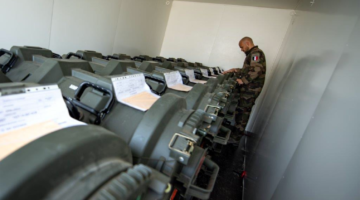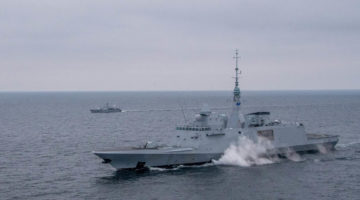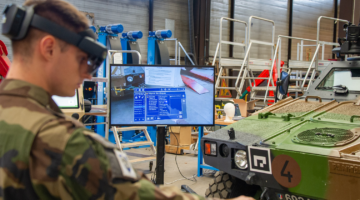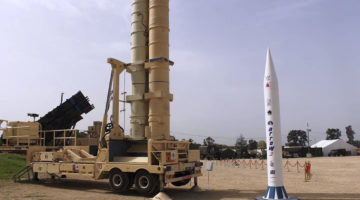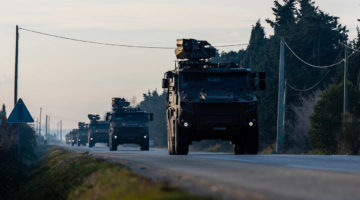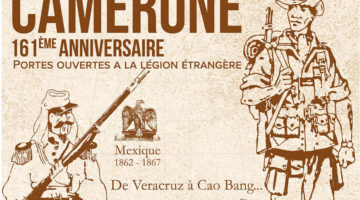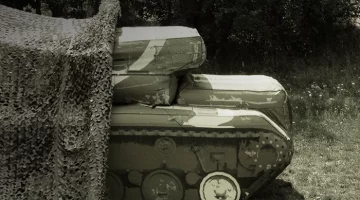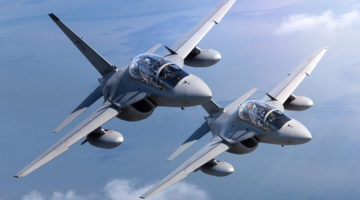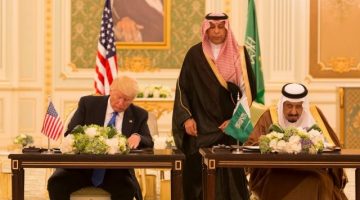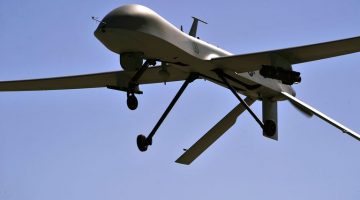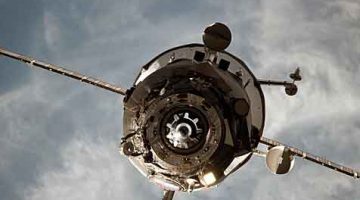Working Common Security Challenges
The Foreign Minister of Kazakhstan, H.E. ErlanIdrissov, recently visited Washington and co-chaired the third U.S.-Kazakhstan Strategic Partnership Dialogue.
A story from: www.sldinfo.com / Photo Credit: John Kerry’s Remarks With Kazakh Foreign Minister Yerlan Idrissov Before Their Meeting, http://www.state.gov/secretary/remarks/2014/12/234915.htm
According to a Fox News story, Kazakhstan is an important ally in dealing with a number of issues, ranging from Islamic terrorism to nuclear security.
Kazakhstan supports the United States in the struggle against Islamic State, the Central Asian nation’s foreign minister said Wednesday in Washington, where he also took the opportunity to urge a “peaceful solution” to the crisis in Ukraine.
Erlan Idrissov addressed those issues, among others, in a meeting with U.S. Secretary of State John Kerry.
“Terrorism is a global phenomenon. The so-called Islamic State is a very ugly face of that unfortunate illness,” Kazakhstan’s top diplomat told Efe after his discussion with Kerry.
“The IS,” Idrissov stressed, “has become an international issue. Consequently, we welcome and we support the international community’s efforts to battle against the so-called Islamic State.”
Asked whether Washington has requested Kazakh military support for U.S.-led operations against IS in Syria and Iraq, Idrissov said: “The United States has made a universal appeal to all members of the international community to participate.”
“We have our way of addressing that matter, especially via cooperation between our respective agencies. That is very important,” the foreign minister said, without offering any details.
“Terrorism doesn’t recognize borders. It has become a global threat. Therefore, joining forces is a very wise and indispensable way of confronting that challenge,” he said, insisting that IS “does not deserve the name of Islam, because Islam is a very peaceful religion.”
Speaking to reporters before the meeting at the State Department, Kerry hailed the “growing security partnership” between the United States and Kazakhstan.
“We are working on the challenge of ISIL (Washington’s term for Islamic State), of counterterrorism,” the secretary said.
The two officials also discussed the conflict in Ukraine, a dispute that “makes life in Eurasia very complicated,” Idrissov told Efe.
“Kazakhstan is very unhappy with the fact that this crisis has still not been resolved,” he said, though adding that he was optimistic about a possible solution…..
Idrissov and Kerry also talked about the situation in Afghanistan, where Astana is supporting the security forces, as well as nuclear proliferation, Iran’s nuclear program and the Ebola epidemic in West Africa.
The minister’s agenda in Washington includes securing U.S. backing for energy-rich Kazakhstan’s bid to join the World Trade Organization.
“This is a very important point in our bilateral dialogue,” Idrissov said. “The U.S. supports Kazakhstan’s accession, but this matter is technically very complex. I hope that Kazakhstan enters the WTO sooner rather than later.”
President Barack Obama’s administration is “working hard on Kazakhstan’s accession to the WTO,” Kerry said at the State Department.
Not on the agenda is how to deal with the Russians breaking the Warsaw Agreement and the inability of the other signers — the UK and the US — to deal with their commitment to protect the territorial integrity of Ukraine, IF Ukraine gave up their nuclear weapons.
This is a huge hole in the Non-Proliferation Treaty, after the Russian invasion and occupation of Crimea
The meetings concluded with the issuance of a joint statement, which constitutes the output of the Third U.S.-Kazakhstan Strategic Partnership Dialogue.
What follows are his official remarks made on December 10, 2014 at the 2nd Kazakhstan – U.S. Convention on “Working Together For a Secure Future” at the Political Session “Turning Great Games into Great Gains.”
Ladies and gentlemen,
It is a great pleasure to be back here, to have the chance to reconnect with old friends and, hopefully, to make some new ones. I want to thank the Council of Turkic American Associations for helping to put together this event. Also, let me express my appreciation to the Atlantic Council for providing intellectual input and content for portions of the Convention as a knowledge partner. And I would like to thank all of the sponsors of the Convention and the U.S-Kazakhstan Business Association.
On a personal note, I must express my gratitude to Ambassador Umarov and his able team at the Embassy of Kazakhstan here in Washington, D.C. They do an extraordinary job representing the interests of Kazakhstan in the United States – a task, I know from personal experience, is not easy in the very competitive D.C. environment. So, thank you!
As for our delegation from Kazakhstan, Minister of Economic Integration Zhanar Aitzhanova is with us today, we also have high-ranking representatives of the Ministry of Investments and Development, National Chamber of Entrepreneurs of Kazakhstan, National Export and Investment Agency “Kaznex Invest” and national company “Astana EXPO-2017”.
Kazakhstan’s destiny has been determined by our location at the “Heart of Eurasia”, which has shaped our foreign, trade, energy and development policies. We have embraced this reality and worked hard to position ourselves as a bridge between Europe and Asia connecting East with West, the North with the South, and developed and implemented genuinely a “multi-vector foreign policy.”
Two years ago, Kazakhstan embarked on a new, long-term development plan – the 2050 Strategy. At its heart is the ambition for our nation to become one of the world’s 30 most developed countries by 2050.
We knew, of course, the path to achieving this ambition was never going to be smooth. There are always bumps on the way and setbacks to overcome. And in recent months, the geopolitical crisis and the sanctions policy of the leading powers have created an additional challenge for us. Kazakhstan, as a part of the world economy and a country located very close to the epicenter of geopolitical tensions, is experiencing the negative impact of these forces. We see the results with prices in global markets dropping, and general economic growth slowing down.
We have responded to these immediate challenges by adopting a New Economic Policy “NurlyZhol”. This is counter-cyclical in character and will allow us to stimulate our economy and continue its structural reforms.
Over the past years of strong growth in our economy, we have deliberately put aside revenues from our extractive industry into the National Fund. We will now use funds from it to further transform our economy – develop transport, energy, industrial and social infrastructure, and empower our small and medium businesses.
The over-arching goal is to bring together all regions of Kazakhstan through an improved network of railroads, highways, and air services. Better connections between the regions will lead to greater national well-being, strengthening trade and economic ties and leading to the emergence of new markets. “Nurly Zhol” has been designed to create a multiplier effect in other economic sectors. Cargo traffic will accelerate and increase. The volume of trade moving through and across the country will grow. By bringing together distant parts of the nation through this New Economic Policy we will also strengthen global transport links between Europe and Asia.
Ladies and gentlemen, there is a long way to go before our country can join the ranks of the most development nations but we are starting from a strong position. We have made great progress since our independence in 1991. Our vibrant market economy has grown twenty-fold. For the past decade we have been the fastest growing nation in the region and are now the economic powerhouse of Central Asia.
But we also continue to look beyond our borders. As a land-locked country, Kazakhstan knows the prosperity of our neighbors is also crucial to our progress. Realizing the potential of the “New Silk Road” is essential for ensuring regional security in the immediate future. Only through economic development and political stability is it possible to win hearts and minds of people.
We also recognize that with good fortune comes an even greater responsibility. Soon, we will launch a new agency for international development – KazAID that will focus initially on Central Asia and Afghanistan.
The situation in Afghanistan, in the wake of the recent elections and the withdrawal of the peacekeeping contingent, is a matter of real importance for the wider security of Central Asia.
Here, too, we are ready to accept our responsibility. The Government of Kazakhstan has allocated $2.38 million for the construction of social infrastructure in Afghanistan. Emergency food assistance of more than $17 million has been provided. We have also allocated $50 million to train around 1,000 Afghan students in Kazakhstan universities. The first group of civilian graduates will soon successfully complete their education and join the peaceful reconstruction process in Afghanistan.
We support Afghanistan’s integration into regional structures. In 1992, Kazakhstan initiated the convening of the Conference on Interaction and Confidence Building Measures in Asia (CICA). The Conference has grown into a multi-national forum for enhancing cooperation and promoting peace, security and stability in Asia. I am confident that, in the near future, we will be able to strengthen it so it becomes an Organization for Security and Development in Asia. This will further contribute to Asia’s regional security architecture. We are happy that Afghanistan is already an active member while the U.S. has an observer status in the CICA process.
Ladies and gentlemen, the geographical position of Central Asia and the recent rise in tensions has raised fears that it could become an arena again for a new “Great Game”. Kazakhstan firmly believes instead it should be seen as theplatform for a “Great Gain” – a place where interests converge rather than collide. This requires everyone to replace a “zero sum” mentality with a “win-win” approach in which economic cooperation benefits all and provides the base to build widespread trust and prosperity.
This is exactly how we seethe Eurasian Economic Union (EEU). Now ratified by all three countries, the Treaty will come into force on Jan. 1, 2015. The EEU will be formed through the merger of existing structures – the Customs Union and the Common Economic Space – enabling us to simplify the governance process.
Early next year Kazakhstan will also join the WTO – a step that will further accelerate our growth and integration into the global market.
At the same time, Kazakhstan has deepened its relationship with the European Union. Next year, we will become the first Central Asian state to sign an Enhanced Partnership and Cooperation Agreement (EPCA) with Brussels.
This identifies no less than 29 sectors for increased cooperation and, in many respects, is similar to the Association Agreement signed between Ukraine and the EU.
From all of this you can see that we are gradually transforming Kazakhstan from a “land-locked” to a “land-linked”nation.
Our Government has also been working hard to encourage foreign direct investment.
So this year, we have introduced new tax exemptions for foreign investors – from corporation tax and land tax for 10 years and from property tax for 8 years. On top of these exemptions, the Government is ready to provide an investment subsidy – in the form of reimbursement of up to 30% of capital costs by the state once a production facility is operating.
We have also eased the process of bringing foreign educated and highly-skilled labor into the country. All foreign companies now have the right to deploy their own specialists for the period of the investment project and up to one year after its commissioning. No additional permissions or quotas are required.
And most importantly – as of June 2014, citizens of the top 10 investor countries, including the United States, can travel to Kazakhstan without a visa for stays of up to 15 days.
We have gone further, uniquely, with the US in this area. Both Kazakh and American citizens can now obtain 5-year, multi-entry visas. Already thousands of our citizens have benefited from this arrangement.
The next big step we see for ourselves is to establish direct flights between our big cities. We are starting this week the negotiations between our two civil aviation regulatory agencies.
***
Ladies and gentlemen, these ties and initiatives highlight the strong, dynamic and enduring strategic partnership between our two countries. This now goes back 22 years when the United States was the first country to establish its diplomatic presence in Kazakhstan. From these beginnings, the scope of our relationship has expanded and strengthened in all directions.
We have worked together and continue to do so in the field of nuclear non-proliferation and disarmament, through the Nunn-Lugar Counter Threat Reduction Program. Our Presidents meet at the Nuclear Security Summits to keep the global agenda in this area moving forward.
Our leaders also regularly hold conversations on other global and regional issues, as well. The convergence of our interests and shared goals has brought about unprecedented cooperation on regional and global security, economics and trade, science and technology, clean energy, and counterterrorism. By establishing the Strategic Partnership Dialogue, we are showing our determination to continue deepening U.S.-Kazakhstan political and economic engagement. As part of this process, I and Secretary Kerry will co-chair the 3rdmeetingofthe Strategic Partnership Dialogue today.
Economically, the links are strong and growing. The United States continues to be a leading investor with over $26 billion in the Kazakh economy. Last year the trade turnover between our countries increased by 9%. But we firmly believe that there is potential for a great deal more co-operation.
As you may know Kazakhstan is preparing for EXPO 2017 in Astana, with the featured theme of “Future Energy”. We hope it will serve as a catalyst for greater dialogue and collaborative solutions to energy challenges. We look forward to seeing a U.S. national pavilion there and I want to encourage American companies to take part.
Energy issues are regularly discussed at the meetings of the U.S.-Kazakhstan Energy Partnership Commission. In June the 10th meeting was held during the visit of U.S. Deputy Secretary of Energy Dan Poneman to Astana.
We look forward as well to advancing our Science and Technologydialogue through the Joint Commission we established last year. The Kazakh Ministry of Education and Science is already putting together a team of experts for a 2nd Meeting of the Commission to be held here in Washington next summer.
One of the most active participants of this Joint Commission is Nazarbayev University. It has established relationships with a number of American universities, such as Carnegie Mellon, Duke, Pittsburgh and Harvard Universities. With these partnerships and by actively participating in the S/T Commission, the NU is building its academic and research potential in biotechnology, energy, seismology, water resources management, IT-technology and environmental protection.
I am also happy to mention the growing ties between our Defense Agencies. They are now implementing the 3rdFive-year Cooperation Plan. Its main focus is on training and equipping Kazakh peacekeeping and special units, military education and joint exercises. Kazakhstan seeks partnership with the U.S. defense companies and support of the Pentagon to develop its defense industry.
***
To conclude my remarks, I want to repeat that we see the Kazakhstan-American strategic partnership as absolutely invaluable to our development and security. We believe as well that Kazakhstan has proved to be a reliable strategic partner and a responsible stakeholder in regional and global affairs. We are determined to continue working shoulder-to-shoulder with the U.S. on our many shared priorities,
I am proud of the Kazakhstan’s progress over the past years and am grateful to all our partners who invested politically, economically and intellectually in Kazakhstan along the way. The United States has been and is a true friend on our journey.
We in Kazakhstan appreciate this and are ready to work to make our Partnership even stronger.
Thank you.
And what follows is the agreed upon Joint Statement by the United States and Kazakhstan, issued on December 10, 2014:
10 December 2014
U.S. DEPARTMENT OF STATE
Office of the Spokesperson
Washington, D.C.
December 10, 2014
Joint Statement of the Third U.S.–Kazakhstan Strategic Partnership Dialogue
On December 10, 2014, Kazakhstani Foreign Minister Erlan Idrissov paid an official visit to the United States. During his visit, U.S. Secretary of State John Kerry and Foreign Minister Idrissov co-chaired the third meeting of the Strategic Partnership Dialogue.
During the meeting the two sides recognized the significant progress that has been made in the bilateral relationship since the inaugural Strategic Partnership Dialogue was held in Washington, April 9-10, 2012. The two sides highlighted the robust and growing bilateral ties between Kazakhstan and the United States and reaffirmed their commitment to further deepen the strategic partnership. The United States expressed its unwavering support for Kazakhstan’s independence, sovereignty, and territorial integrity as Kazakhstan marks the 23rd anniversary of its independence on December 16. The wide-ranging discussions on bilateral and regional issues in the Strategic Partnership Dialogue included the following:
Partnership on Global Issues
Kazakhstan and the United States are committed to sharing their experience on how to address the most pressing global and regional problems. Kazakhstan and the United States agreed that ISIL poses an immediate threat to the people of Iraq and the entire region. Kazakhstan and the United States confirmed their commitment to strengthen cooperation on global counterterrorism and counternarcotics issues. The United States welcomed Kazakhstan’s initiative to convene the 5th Congress of Leaders of World and Traditional Religions, June 10-11, 2015, in Astana. Kazakhstan expressed its willingness to host P5+1 talks with Iran on the Iranian nuclear program and encourages all parties to continue negotiations in a constructive manner in order to reach a comprehensive arrangement in 2015. The United States appreciates its open dialogue with Kazakhstan on the crisis in Ukraine and welcomed Kazakhstan’s contribution to the OSCE Special Monitoring Mission (SMM) to Ukraine and its commitment to provide economic assistance to Ukraine. The United States expressed its appreciation for Kazakhstan’s contribution to the United Nations Ebola Emergency Response.
Nonproliferation
Kazakhstan and the United States reaffirmed their shared commitment to prevent the spread of weapons of mass destruction. Threat reduction and nonproliferation remain important pillars of our joint efforts to ensure global and regional security. Kazakhstan welcomed the signing by the United States and other nuclear-weapon states of the Protocol to the Central Asian Nuclear-Weapon-Free Zone Treaty in May 2014 and encourages the United States to ratify it in the near future. Kazakhstan and the United States both look forward to a successful Nuclear Non-Proliferation Treaty Review Conference in 2015 and intend to pursue consensus on practical and balanced steps to strengthen the Treaty. The United States confirmed its readiness to consult with Kazakhstan on its interest in membership on the IAEA Board of Governors, and welcomed Kazakhstan’s continued interest in membership in the Missile Technology Control Regime, the Australia Group, and the Wassenaar Arrangement. The United States praised Kazakhstan’s continued collaboration on security, safeguards, and disposition of nuclear materials and is pleased to support Kazakhstan’s efforts to establish a regional Nuclear Security Training Center in Kazakhstan. The United States continues to support Kazakhstan’s offer to host an IAEA Low-Enriched Uranium Bank. Both sides plan to continue their cooperation on the rehabilitation of the former Semipalatinsk Nuclear Test Site and on establishing the Central Reference Laboratory in Almaty.
Democracy, Human Rights, and Development
Kazakhstan and the United States reaffirmed the importance of democratic development and respect for human rights, which include efforts to strengthen representative institutions such as independent media and local self-government. Both sides acknowledged the importance of a vibrant and varied civil society. The United States welcomed the work of the Consultative and Advisory Body “Dialogue Platform on Human Dimension” launched by Kazakhstan’s Ministry of Foreign Affairs and non-governmental sector and encourages continued cooperation to enact recommendations made by this body.
Trade, Investment, and Energy
The United States reaffirmed its support for Kazakhstan’s membership in the World Trade Organization and its intention to continue to work with Kazakhstan to complete its accession process as soon as possible. Both sides place high importance on the intensification of bilateral trade and investment cooperation while respecting international commitments and standards. In particular, the United States and Kazakhstan intend to work together to support both the diversification of Kazakhstan’s non-oil sector and expansion of its role in global energy security as Kazakhstan pursues its 2050 Strategy. Kazakhstan and the United States plan to organize a business development mission to Kazakhstan in 2015 and to work together to establish a permanent dialogue to facilitate trade and economic cooperation. The two sides look forward to the Energy Partnership’s 11th Annual Meeting in 2015.
Afghanistan and Regional Integration
The United States welcomed Kazakhstan’s leadership role in supporting security in Afghanistan and the region, including Kazakhstan’s contribution to the Northern Distribution Network and its support for the Istanbul Process. The United States values Kazakhstan’s assistance to the Afghan National Security Forces and its $50 million scholarship program to educate one thousand Afghan students in Kazakhstan universities. The United States welcomed Kazakhstan’s economic connectivity efforts and, in particular, its contribution to the construction of four bridges in Samangan Province in Afghanistan, as well as its investments in regional infrastructure such as the Kazakhstan-Turkmenistan railroad and the Caspian seaport of Aktau. Kazakhstan and the United States intend to continue working closely together to support stability, peace, and prosperity in Afghanistan and the region.
Security and Law Enforcement Cooperation
Both sides affirmed their continued collaboration to expand law enforcement cooperation, including through the Memorandum of Cooperation between the Federal Bureau of Investigation and Kazakhstan’s Office of the Procurator General. Kazakhstan and the United States welcomed the initialing of the draft Mutual Legal Assistance Treaty in Criminal Matters and expect to have it ready for signing in 2015.
Military Cooperation
Kazakhstan and the United States are committed to strengthening military cooperation through capacity-building programs according to the Five-Year Military Cooperation Plan. Priority programs include professionalization of the Kazakhstani Armed Forces, expansion of its non-commissioned officer corps, modernization of its Professional Military Education system, and U.S. support for Kazakhstan’s peacekeeping deployment capability through the annual military exercise Steppe Eagle.
Education, Science and Technology Partnership, People-to-People Contacts
Kazakhstan and the United States affirmed their commitment to increase educational exchanges. The United States is committed to expanding opportunities for Kazakhstanis to study and train in the United States, including through the Future Leaders Exchange (FLEX) and Fulbright Programs, and to continuing U.S. investment in English-language training to support Kazakhstan’s vision of becoming a trilingual society. The United States and Kazakhstan reaffirmed their commitment to strengthen scientific and technical cooperation among scientists, engineers, and students at research institutes and in the private sector in the context of the Joint Commission on Science and Technology, which is to reconvene in 2015 in Washington. The United States looks forward to working with Kazakhstan when it becomes the new host for the International Science and Technology Center in 2015. Kazakhstan and the United States noted with satisfaction that thousands of Kazakhstani and U.S. citizens have benefited from the introduction in 2013 of five-year visas for Kazakhstanis visiting the United States and the elimination of Kazakhstan’s visa requirements for U.S. investors and tourists on brief visits to Kazakhstan. Kazakhstan and the United States affirmed their commitment to increase people-to-people contacts between the countries in recognition of the importance of these links to strengthening our partnership.
Development and Humanitarian Assistance
The United States welcomed Kazakhstan’s efforts to establish a national system of official development assistance, KazAID, which should strengthen Kazakhstan’s efforts to assist other countries in the region. The United States looks forward to continuing and, as appropriate, expanding its joint program with Kazakhstan to leverage USAID’s capacity to contribute to Kazakhstan’s development goals.
EXPO-2017
Kazakhstan encourages U.S. private companies in the sphere of renewable energy and energy efficiency to participate in EXPO-2017. The United States praised Kazakhstan’s efforts to promote international cooperation on sustainable energy and climate change through EXPO-2017, as well as through initiatives such as the “Green Bridge Partnership Program.”

